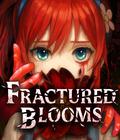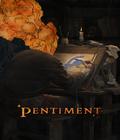Point-and-click adventure has always been my favorite genre video game genre with brain teasers around every corner, interesting settings and characters, and a primary focus on narrative. Disco Elysium changed my outlook on what a story-driven adventure game could be. It combined a story-heavy detective adventure with deeper RPG and choice mechanics than I've seen anywhere else, creating a much more engaging and interesting experience. Since then, we've had quite a few games that tried to go down a similar path with varying degrees of success. Pentiment, developed by Obsidian, isn't a clone of Disco Elysium, but it shares some common game design DNA. It explores its historical setting through player choices that unfold over time, making it exciting, deep, and unapologetic. It can be a bit of an acquired taste at times, though.
Focusing less on RPG mechanics and utilizing a real-world setting, Pentiment is an interesting investigation and display of 16th-century Bavarian society, all wrapped up in several violent criminal cases that span a quarter of a century. We control Andreas Maler, who spends his early years in the Bavarian town of Tassing at a Benedictine abbey to help with script work and to finish his masterpiece. While your sights are set on Nuremberg to eventually become a master artist, you are part of the local town for now.
Then chaos ensues.
After a nobleman is killed in the abbey and your mentor is caught red-handed, you take it upon to yourself to find the actual murderer and keep your friend off the chopping block. It's the first of several mysteries in Tassing, each occurring several years apart and yet somehow connected to a larger thread. As such, time jumps are frequent, and with each case, the community around you changes. Revolts are formed and disbanded, Catholicism faces Lutheran reform, and scripts copied by hand slowly vanish in favor of woodcutting and book presses. It's a time of change, due to external and internal circumstances — and your decisions in Tassing.
What makes Pentiment especially interesting is how it plays. First and foremost, it's a story-driven, point-and-click adventure game that offers some branches based on your actions. In practice, that means you have limited time slots in a day to perform certain tasks. There's work with a brief lunch break in the first half, then dinner, some afternoon activity, and sleep in the second half. Strolling around town and talking to people does not advance time, but more involved tasks, such as following a suspect or breaking into a building, will usually take an entire chunk of the day.
In each case, you'll have a bunch of suspects and hunches to follow up on. However, Pentiment will never tell you what to do or lead you to a firm conclusion. It's easy to get distracted or follow the wrong path altogether, so solving each case isn't always as straightforward as it may seem. At the end of the day, the player decides who to blame, and the consequences will ripple through the remainder of the game. You may be able to find clues and proof to pin the most likely perpetrator, but if you'd rather remove an especially annoying or evil character instead, you are welcome to do so. In my first case, I fixated on a specific character who behaved weirdly, only to find justified reasons for the behavior that are unrelated to the murder at hand. I was running out of time, so I had to decide whether to accuse that individual, knowing full well that my friend's neck would meet the sword otherwise.
The way Pentiment treats decisions is interesting, and it's easily its strongest feature. I haven't completed additional playthroughs yet, but it's clear that there's a decent degree of choice and branching paths to explore. Andreas seems to be the protagonist of this story, but he is only part of a story that's much bigger than himself. Within the town and among its inhabitants, your choices and consequences are seen and felt — sometimes immediately, sometimes after years or decades.
I've already mentioned that Pentiment doesn't opt for traditional RPG mechanics like Disco Elysium, but that's not the whole story. When starting the game, Andreas had previously studied at a university to no avail, but he has some scraps of remaining knowledge. The player can decide on the background and which regions of the world Andreas has previously seen. For example, we started the game with a proficiency in French, decent public speaking skills, and a law background. Going forward, we can engage in those topics with additional dialogue options that may aid us in solving cases.
Since time passes between each case, our protagonist acquires additional skills along the way, adding new dialogue options for each case and game section. The game uses a skill check system for certain dialogue options, which are mostly influenced by previous decisions and choices. Even though Pentiment is a small-scale game, it provides you with a lot of freedom and choice to tackle its story and see changes unfold over time. This freedom makes revisiting the adventure worthwhile for several playthroughs, depending on your choices and their outcomes.
The cases are a device to explore the relationships and societal structures of the time, with a heavy emphasis on arts and crafts. Its unapologetic insistence on historical accuracy in both appearance and content might not feel appealing to some. This is a text-heavy game with a ton of dialogue, none of which is voiced. Instead, inhabitants in the city speak with different writing styles. Plain cursive with a ton of spelling errors for the peasants, fine scripture for the clergy and noblemen, or printed text for the local printers. Text is written with some colored accents, such as red for religious characters and expressions, as would be the case in scriptures from that day and age.
Pentiment also goes out of its way to provide concentrated glimpses into the daily lives of most inhabitants. During lunch or dinner, you are usually hosted by a family or person of your choice. You'll engage in conversation that may pertain to the current case but may just illustrate their general well-being or frustration, such as the enormous taxes demanded by the abbey, the miller being an unpleasant person, or disdain toward the common folk. You'll be served vastly different foods, from basic to expensive, and you may eat more than the children of an impoverished family because you're a guest.
Other times, you may participate in one-off minigames. Some of them are in connection to the current case, but there are also the occasional card games and craft-related exercises. If you have the patience for it, the attention and commitment to getting every single detail right is astonishing and enriches the experience tremendously. If not, the experience will probably feel sluggish as it delves into deeply detailed text-driven conversations. It's a slow burn, and it frequently feels like reading comprehension work; if that's not something you're up for, the adventure can drag on sometimes.
You may opt to use the accessibility mode to simplify the writing, and I could see that some people would need it. Some of the texts are hard to read and often animated in a way that can make some sentences difficult to comprehend, especially in the absence of voice-over options. It's an involved experience and can become slow-paced at times, which isn't helped by the wall of text you see every step of the way. Pentiment also uses unique vocabulary and references to a variety of events or characters, which are underscored in red and have references you can look up. For example, it may show a picture of the person referenced in a conversation, in case you forgot who they were, and a glossary explains the most important keywords. If you're a history buff, there's no better way to get immersed in this period.
The commitment to historical accuracy transcends every fiber of the experience. The visuals are a cohesive mix of art and prints from the period. It took a while to grow on me, but it represents the time and story remarkably well. It's beautifully animated and colorized from start to finish. Each scene in the game is a picture on a page in a book, and the pages flip back and forth as you walk around the town of Tassing and the abbey.
There is truly little to complain about in the presentation, but if I had to nitpick, the sound design wasn't always to my liking. Due to missing voiceovers, you'll hear a lot of scribbling on parchment paper, and during scenes with little to no music, that can be very distracting and monotonous. When music is playing, you'll be treated to accurate arrangements that mirror the musical culture around the time. It's no Hans Zimmer, but it fits so perfectly well, just like everything else, that you can't but admire the effort and craftsmanship involved.
What's even better is that we didn't encounter a single technical issue during our review period on the PC, which is always a great sign nowadays. That said, I wasn't too much a fan of its save system. Pentiment autosaves automatically, with no way to manually save or load. While that isn't too novel for a choice-based game, I found that sometimes, the auto-save function didn't save often enough. There were some cases when I was locked in lengthy conversations with no way to save and return without restarting them. I'm also not a huge fan of the maps, menu, and interface. They aren't overly complicated, but they are written in cursive and laid out weirdly in a small notebook, which makes tracking your current notes and objectives a bit cumbersome.
As a story-driven adventure game, Pentiment is a history lesson come to life, with some intriguing mysteries to solve and tricky decisions to make. It's a vertical slice of history, and it provides a glimpse into a turbulent period through the experience of a small town. The experience can be a bit sluggish because it sometimes values historical accuracy over player comfort. Your choices impact the Bavarian town of Tassing over a quarter of a century, all while uncovering a truly interesting mystery. Tassing is the actual protagonist here, and I thoroughly enjoyed the experience of being an integral part in its community and participating in its struggles. It's a bit special and stubborn in its delivery, but Pentiment is an interesting and worthwhile investigation of the period, its customs, and its issues.
Score: 8.5/10
More articles about Pentiment











 Set in 16th century Bavaria, Pentiment will take players on a narrative journey through the eyes of Journeyman Artist Andreas Maler during a time of great social unrest.
Set in 16th century Bavaria, Pentiment will take players on a narrative journey through the eyes of Journeyman Artist Andreas Maler during a time of great social unrest.












